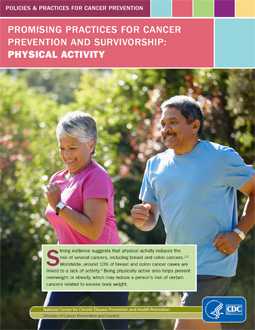Policies and Practices for Cancer Prevention and Survivorship: Physical Activity
Strong evidence suggests that physical activity reduces the risk of several cancers, including breast and colon cancers.1,2 Worldwide, around 10% of breast and colon cancer cases are linked to a lack of activity.3 Being physically active also helps prevent overweight or obesity, which may reduce a person’s risk of certain cancers related to excess body weight. This resource provides information on physical activity in children, adults, and cancer survivors, and strategies for increasing physical activity in your community.
Breast Cancer
- In 2013, there were 230,815 cases of female breast cancer in the United States.4
- Physical activity is associated with a median 20% reduction in the risk of breast cancer.2
- Physical activity reduces the risk of both premenopausal and postmenopausal breast cancer.5
- Physical activity reduces risk in women with and without a family history of breast cancer.6
- Vigorous physical activity provides the largest reduction in breast cancer risk, but even moderate-intensity activity, such as brisk walking, provides a benefit.5,6
Colon Cancer
- In 2013, there were 96,923 cases of colon cancer in the United States.4
- Physical activity is associated with a median 30% reduction in the risk of colon cancer.1,2,7
- More physical activity and higher intensity physical activity are associated with the largest reductions in risk.1
Cancer Survivorship
In addition to helping prevent cancer, physical activity is also important for cancer survivors. One-third of cancer deaths in the United States are linked to physical activity and dietary factors.8 Cancer survivors who are physically active have a better quality of life and better physical fitness than survivors who are inactive. They may also have a lower risk of developing other chronic diseases, such as heart disease and diabetes.
In addition, studies suggest that adults with breast or colon cancer who are physically active are less likely to die prematurely or have a recurrence of their cancer. Physical activity may also play a role in reducing adverse effects of cancer treatment.9
- Page last reviewed: November 29, 2016
- Page last updated: February 6, 2017
- Content source:
- Maintained By:


 ShareCompartir
ShareCompartir
